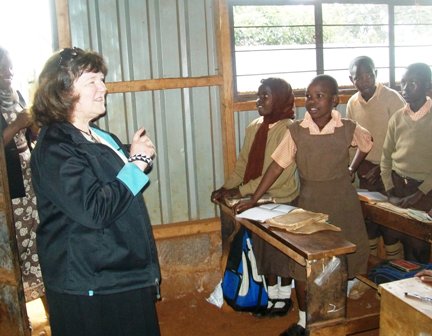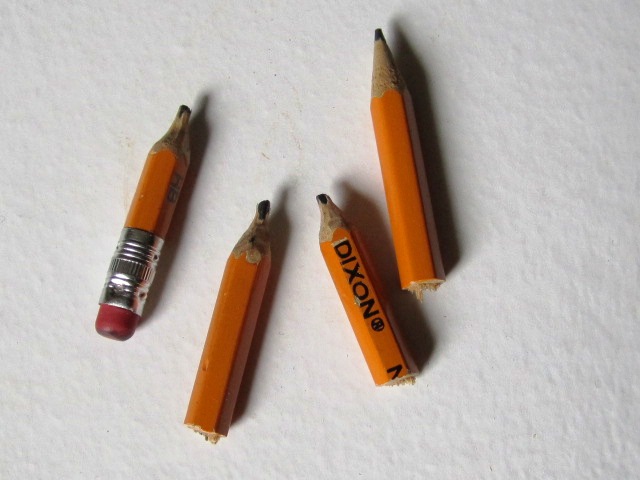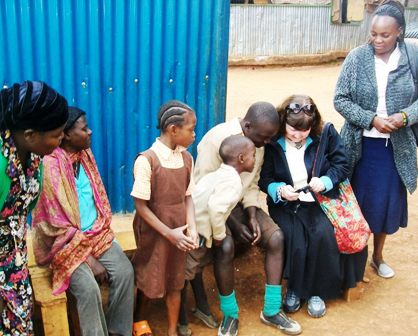TDSB Principal Visits Kenyan Schools
The Power of a Pencil!
 TDSB Principal Judy Whitfield encourages a classroom of Kenyan students.TDSB Principal Learns About Schools in Kenya
TDSB Principal Judy Whitfield encourages a classroom of Kenyan students.TDSB Principal Learns About Schools in Kenya
“Tell them how important it is to get an education. Tell them that they must work hard!” With these repeated urgings from local teachers ringing in her ears, TDSB Principal Judy Whitfield addresses dozens of Kenyan classrooms, where eager children hang on her words.
Ms. Whitfield as part of the Canadian delegation at the 6,000 strong Kenyan School Principals’ Conference in July 2012 was treated to a tour by the Kenyans who were proud to showcase their schools for the Canadian visitors.
It was evident that access to education is highly prized in Kenyan society. Seared in Ms. Whitfield’s memory is the image of children hurrying to school, each tightly gripping a pencil in his or her fist, as though their life depended on it, an image that speaks of challenges few Canadian children face.
Her escort explained that in fact, children’s lives do depend on that pencil. Having or not having a pencil can change the course of a child’s life. Without a pencil, a Kenyan child is not allowed to attend school. Without a pencil, the chance for education is cut off! “We learned as children,” Ms. Whitfield’s young companion continued, “to be very careful with our pencils. “We didn’t put the pencil in a knapsack, in our pocket, or behind our ear, where it can get lost or stolen. In the morning when we left for school, our mother put the pencil in our hands, where we could see it, and told us to hold it tightly until we got to school.”
 A pencil divided into four pieces, each one a ticket that enables its owner to go to school!Entry ticket to education
A pencil divided into four pieces, each one a ticket that enables its owner to go to school!Entry ticket to education
In a poor family in Kenya, in order to allow all the children to go to school, a pencil will be cut into pieces so that each child has a tiny piece. Similarly, notebooks will be divided into parts so that each child has something to write on. A child’s life does indeed depend on a pencil. That pencil is an entry ticket to an education. It is an exit ticket from the cycle of poverty! To find out how YOU can ensure that children have that ticket out of poverty, click SEND A CHILD TO SCHOOL.
 Curious school children watch as Ms Whitfield shows them what can be done on a Blackberry. Village of Love volunteers and a beneficiary look on with equal interest! Computer Resources
Curious school children watch as Ms Whitfield shows them what can be done on a Blackberry. Village of Love volunteers and a beneficiary look on with equal interest! Computer Resources
Since their first conference on e-learning in 2010, Kenyan educators have striven to transform the education system through the employment of e-technology. It has not been an easy shift, however. On the one hand Ms Whitfield visited schools that were impressively equipped with computers, but on the other hand some were obviously lacking in resources. She describes a desolate classroom at Concordia School, filled with broken down computers that didn’t look as though anyone had been able to make them work.
Pride and Gratitude!
Despite the lack of resources, Ms. Whitfield was impressed at how proudly the children wore their uniforms, tattered or not. Having a school uniform, like a pencil and a notebook, is a ticket into the world of education, and the children want to learn!
Ms. Whitfield’s most vibrant memory is of the children’s ebullient greeting wherever she went, “Jambo! Jambo!” (hello! hello!) and the songs that they were so ready to share with their foreign visitor. On her return to Canada, she ponders the equanimity of the people, their apparent sense of contentment, in sharp contrast with those of us who live in Canada and who have vastly greater material resources.
Perhaps, despite our universal access to education, we have much to learn about living from our brothers and sisters in Kenya!

 Education
Education